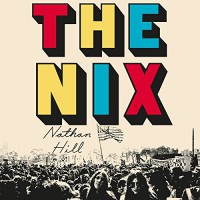
This is one of those books where the idea of moving through the story from beginning to end is treated as a bizarre idea that the reader must abandon early to avoid frustration.
At one point, our hero's agent explains that those who think publishing is about books are obsessing about the container when they should be focusing on the content.
"The Nix" is more like a hologram than a book. The author uses the text to turn the content in the light, letting the reader see it from different angles. The "it" is not really a story, it's a person, our hero. It's who is, who he was, who he will become but it's all of those things at the same time. The hologram is his identity. Although changing the angle at which the reader sees the hologram shows up different aspects of the hologram, the thing itself is there in its entirety and unchanging from the first page to the last.
This means that, although Part 1 ends with our hero meeting his beleaguered mother for the first time in more than two decades, Part 2 takes us backwards, not forwards, to our hero's childhood and because I know something of the man he now is, I see the boy he was differently than if I had met the boy first. The man is not the outcome of the boy, the boy is the outcome of the man.
This may sound weird but it feels normal and easy to understand when I'm reading the book, partly because the author takes this approach to narrative entirely for granted.
What does seem weird is the description of American High Schools in the 1980s. Where they really so authoritarian? Did they really issue passes, that constituted a contract about required behaviour before allowing eleven-year-olds to go to the toilet during class? And did the students really comply? It's described with such forceful clarity that I'm inclined to believe it but it feels very alien to me.

 1
1









